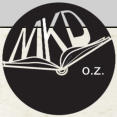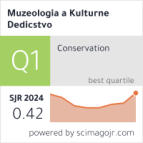

MUZEOLÓGIA
MUSEOLOGY
a kultúrne dedičstvo
and Cultural Heritage

News
Journal Muzeológia a
kultúrne dedičstvo -
Museology and Cultural
Heritage:
SJR 2024: 0,424 (Q1)
Museology SJR rank: 8/83 (Q1) Conservation SJR rank: 11/103 (Q1)JIF WoS 2023: 0,6
JCI WoS 2023: 1,28, Q1 ESCI: 49/411 (Q1)New issue
Muzeológia a kultúrne
dedičstvo 2/2025
online New volume Studia Museologica Slovaca, vol. 8 (2024) online New volume Populačné štúdie Slovenska 17 (2024) onlineNew book
P. Tišliar (ed.). Osobnosti uměleckoprůmyslového muzejnictví (2025) online
Contents 2/2020
Title: The beginnings of museology
Abstract: In this paper, we deal with the beginnings of museology, trying to find the common origin of its many contemporary
offspring. Rather than define museology, we aim to discuss the idea of museology. We assume that beneath the diverse
manifestations of museology one can see today, there is a common root and we call this root the idea of museology. Based on
examples tracing the history of other scientific disciplines, in this paper we track two developmental stages in the field of museology:
the development from an idea to professional knowledge, and the development from professional knowledge to academic discipline.
By these means, we aim to establish some of the crossing points in the progress of museology as a science.
Authors: Popadić Milan
Publication order reference: The University of Belgrade, Faculty of Philosophy, Department of Art History, 18-20 Čika Ljubina Street,
Belgrade, 11000, Republic of Serbia, email: milan.popadic@f.bg.ac.rs
Source: Muzeológia a kultúrne dedičstvo, year: 2020, vol.: 8, number: 2, pages: 5-16.
Key words: museology (idea, history, discipline), beginnings, museum studies, history of science
online full-text PDF
DOI: 10.46284/mkd.2020.8.2.1
Title: Museum education in the context of socio-cultural changes in the countries of Eastern Europe
(using the examples of Poland, Ukraine and Russia)
Abstract: The subject of the research presented here is the language and content of the definitional terms, categories and concepts
relating to museum education in the historiography of the topic. The article is a review that provides an analysis of selected papers on
museum education, surveying the categories, terminology and definitions proposed by Polish, Ukrainian and Russian researchers.
The study also involved looking at museum websites to review the descriptive terms, concepts and categories used in the sections
relating to the museums’ educational activities. Finally, against this background the authors present their own approaches and
definitions relating to museum education. The work is partly a result of the experience of the authors’ own common educational
practice and investigations. The cultural contexts of museum education are significant and influential in the quality of the services
provided in each of the surveyed countries and museums. The generalisations presented are appropriate to the specific contexts of
the research reports and educational projects quoted.
Authors: Pater Renata, Karamanov Oleksiy
Publication order reference: Jagiellonian University, Faculty of Philosophy, Institute of Pedagogy, Batorego12 Street, 31–135
Cracow, Poland, e-mail: renata.pater@uj.edu.pl; Ivan Franko L’viv National University, Faculty of Pedagogical Education, Department
of Pedagogy, 7 Tuhan-Baranovsky Street, 79005 Lviv, Ukraine, e-mail: akaramanov@gmail.com
Source: Muzeológia a kultúrne dedičstvo, year: 2020, vol.: 8, number: 2, pages: 17-30.
Key words: Museum Education, Museum Pedagogy, School and Museum, Cultural Education, Cultural Heritage
online full-text PDF
DOI: 10.46284/mkd.2020.8.2.2
Title: Museum education in semi-peripheries: social, cultural and economic aspects of the
globalisation of Polish and Slovak heritage institutions
Abstract: The paper examines the problem of change in Central-Eastern European museum education in the globalising world. The
main objective is to answer the question of whether museums located in peripheral regions of semi-peripheral states introduce
patterns developed in global core-states or maintain the approach invented during the former political period. Its main assumption is
that globalisation is a discursive process engaging global, national and local cultural elements, leading to reshaping of local patterns.
The paper is based on 14 in-depth interviews conducted with curators working at local museums of the Subcarpathian and Košice
regions, supported by four interviews carried out with museum workers of national museums in Warsaw and Bratislava.
Authors: Porczyński Dominik, Vargová Lenka
Publication order reference: University of Rzeszów, Institute of Sociology, Al. Rejtana 16c, 35–959 Rzeszów, Poland, e-mail:
dporczynski@gmail.com; Comenius University in Bratislava, Faculty of Arts, Department of Ethnology and Museology, Gondova 2, 811
02 Bratislava, Slovakia, e-mail: lenka.vargova@uniba.sk
Source: Muzeológia a kultúrne dedičstvo, year: 2020, vol.: 8, number: 2, pages: 31-54.
Key words: Globalisation, Museum Education, Peripherality, Poland, Slovakia
online full-text PDF
DOI: 10.46284/mkd.2020.8.2.3
Title: Values, strengths and futures of museums, libraries and community centres as seen by experts
in the field: First round results of a Delphi study
Abstract: In the process of building local communities with shared cultural values, museums, libraries and community centres are key
agents in civil society. When these institutions project specific notions and ideal types of identity and citizenship, they have the
potential to produce changes in people’s behaviour. It is only natural that political bodies are interested in these processes. On 16
September 2016, the Ministry of Human Capacities of the Hungarian Government launched an EU-funded project with the primary aim
of strengthening social cohesion within the region. As a part of this project, we surveyed 59 professionals working in Hungarian
museums, libraries and community centres, using the Delphi method, to gain insights about their capacities, needs, and visions. This
article presents the results of the first round of analysis. Respondents’ answers were analysed using NVivo qualitative data analysis
software, which resulted in a thematic map showing the main problems professionals in these sectors are struggling with, and
highlighting the kinds of visions they had for their institutions’ future. The study clearly shows that the cultural sector is plagued by
financial problems, and that there is a strong need for reform when it comes to the professional training of workers in these fields.
Regarding the future, visions are centred around cultural institutions increasingly becoming community spaces, thinktanks, and ideas
workshops that consciously guide community formation.
Authors: Tóth János
Publication order reference: Kodolanyi Janos University, Institute of Cultural, Communication and Media Studies, Department of
Communication and Media Studies, st. Frangepán 50-56, Budapest 1139, Hungary, e-mail: tothjanj@gmail.com
Source: Muzeológia a kultúrne dedičstvo, year: 2020, vol.: 8, number: 2, pages: 55-75
Key words: museums, libraries, Delphi method, experts, group judgement, forecasting
online full-text PDF
DOI: 10.46284/mkd.2020.8.2.4
Title: Franz Beranek and his activities in Slovakia
Abstract: This paper deals with the research of Prof Franz Josef Beranek focused on the so called “Habans”, a social religious group
that settled in western Slovakia. This research is reconstructed according to the so called German Archive, which forms a part of the
scientific collections of the Institute of Ethnology and Social Anthropology of the Slovak Academy of Sciences. The first part is focused
on the life of Franz Beranek and his research on the Haban community, including the history, the linguistic situation, and comparisons
to other Anabaptist groups. The second part deals with the procedure of cataloguing the archive and its history, structure, and issues.
Authors: Kubisa Tomáš
Publication order reference: Slovak Academy of Sciences, Institute of Ethnology and Social Anthropology, Klemensova 19, 813 64
Bratislava 1, Slovakia, e-mail: tomas.kubisa@savba.sk
Source: Muzeológia a kultúrne dedičstvo, year: 2020, vol.: 8, number: 2, pages: 76-89.
Key words: Habans, Franz Josef Beranek, Anabaptists, The German Archive, Mennonites, Hutterites, Third Reich, Dialect
online full-text PDF
DOI: 10.46284/mkd.2020.8.2.5
Title: The extinction of the Ukrainian culture of the Polish-Ukrainian-Slovak borderland and the image
of the “Ukrainian Banderite” in Polish and Czechoslovak literature, journalism and cinematography,
mid-1940s–1980s
Abstract: The aim of this study is to outline the process of the extinction of Ukrainian culture in south-eastern Poland as a result of
Polish resettlement actions and the activities of the Ukrainian underground movement (i.e., the Ukrainian Insurgent Army) in the post-
war period (1944–1947). Concurrently, the study offers an analysis of the image of the “Ukrainian Banderite”, created by propaganda
in Polish and Czechoslovak literature, journalism, and cinematography in the period from the mid-1940s to the end of the 1980s. The
authors state that both in Poland and in Czechoslovakia the analysed topic has been subject to certain cyclical waves of interest, or
current political demand or usefulness, but always according to an established and politically accepted template. The black-and-white
reception of the issue, propaganda fictions, the concealment of facts, and the disproportionate highlighting of others, which were
applied in the literary and film production of the real-socialist period, only distorted the historical objectivity of the issue and created a
complicated stereotype in the collective memory.
Authors: Drozd Roman, Šmigeľ Michal
Publication order reference: Pomeranian University in Słupsk, Institute of History, Arciszewskiego 22a, 76–200 Słupsk, Poland, e-
mail: roman.drozd@apsl.edu.pl; University of Matej Bel in Banská Bystrica, Faculty of Arts, Department of History, Tajovského 40, 974
01 Banská Bystrica, Slovakia, e-mail: michal.smigel@umb.sk
Source: Muzeológia a kultúrne dedičstvo, year: 2020, vol.: 8, number: 2, pages: 91-116.
Key words: Ukrainians in Poland, Polish-Soviet resettlements, Operation Vistula, Ukrainian Insurgent Army, image of “Banderite”,
propaganda, literary and film production of the real-socialist period, stereotypes of the collective memory
online full-text PDF
DOI: 10.46284/mkd.2020.8.2.6
Books received and reviews
Oskar J. Rojewski:
Review of the exhibition: “Als Ich Can”, 10 July - 6 January 2020,
Kunstkammer, Kunsthistorisches Museum, Viena (p.117)
online full-text PDF
DOI: 10.46284/mkd.2020.8.2.7
Articles (Abstracts)

Full-text version
DOI:10.46284/mkd.2020.8.2.0
ISSN 1339-2204
eISSN 2453-9759
Vol. 8 (2020), No. Is. 2


























